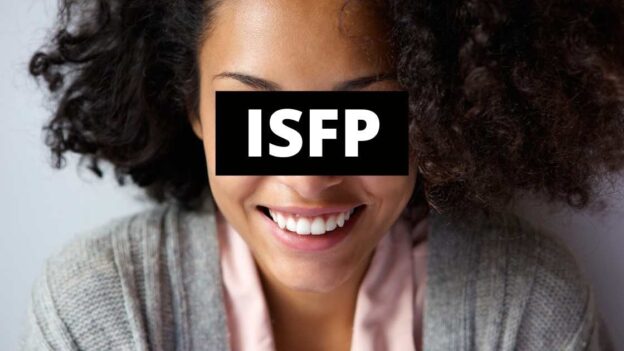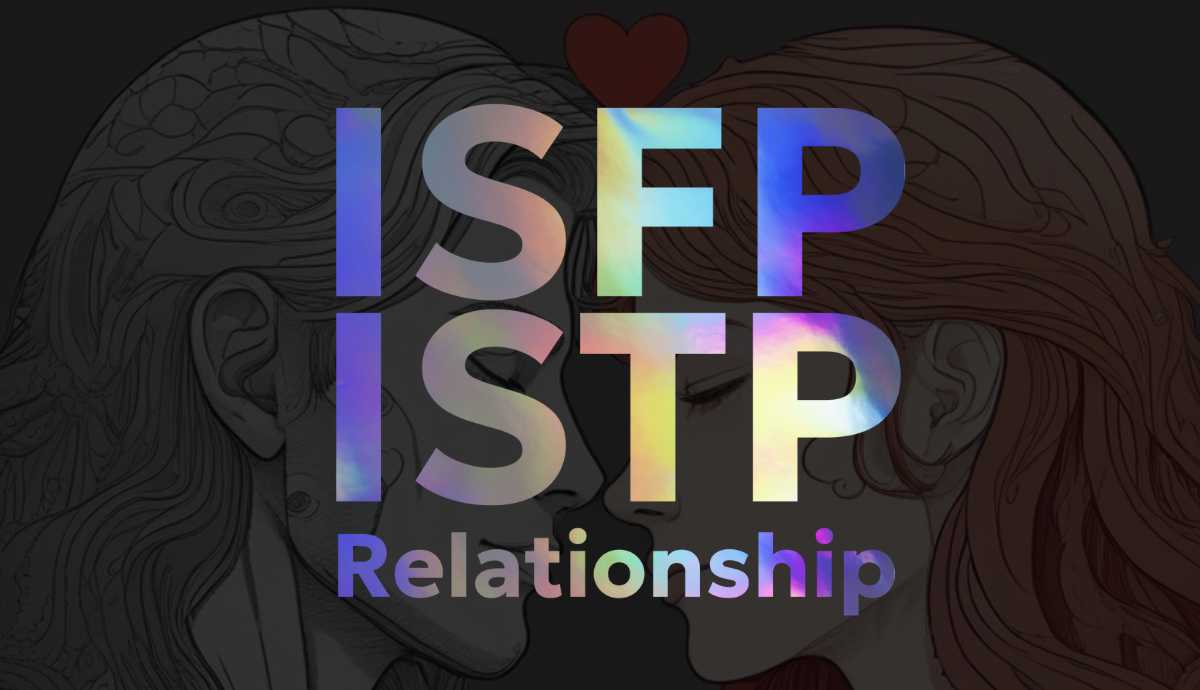The ISFP is one of the 16 MBTI personality types and form part of the “Artisan” temperament group along with the ESFP, ESTP and ISTP. Sensitive, observant and creative, the ISFP person is an introvert who displays an openness to new experiences and adventures. They have been dubbed as the “tactical composer” and “adventurer” and are estimated to constitute roughly 9 to 10% of the population.
ISFPs live in the world of their senses and are individualists who are happy to be unique and true to who they feel they are. They have discriminating tastes and they appreciate and pay attention to details that other types overlook. They have a strong subjective sense of what fits or doesn’t fit aesthetically and artistically. These individuals tend to be quiet and casual in their demeanor. They quietly observe and absorb the physical details of their environment including the people that occupy it. Naturally, they take notice of the way people dress or the particular gait and gestures they use.
They have a fine sense of style and composition that allows them to synthesize all the pieces and details they observe into something beautiful and meaningful. Additionally, ISFPs generally operate on very little preparation and planning. They trust their impulses and their ability to respond and react when the time is right. They welcome random excursions that give them a break from what is otherwise routine and mundane.
With this type, communication is more concrete in tone and they show great craftsmanship and technique in their use of tools. They tend not to be highly verbal and instead express themselves more strongly through actions and artforms. They are tactile and enjoy working with their hands and using their body in practical ways. They immerse themselves in sensory information such as, texture, aroma and flavor.
This is not to say that all ISFPs are artistically gifted painters and musicians. People of this type are not necessarily artists in the narrow sense of painting and sculpting. Rather, it is their approach to life that defines their artisan nature. They desire to explore and allow their impulse and instincts to lead them and their decisions.
They display an openness of thought and show little to no desire to control and dictate to others. ISFPs express a gentle individualism that is often extended to their children. They are willing to give their offspring freedom to explore and discover life for themselves. If they have judger children however, this can pose a problem as such children may feel deprived of a sense of structure and order in their upbringing.
ISFPs are often considered to be the most kind of all MBTI types, second to the ESFP. This type harbors a sense of humanity that governs their actions. They care about people in a more local and practical sense as opposed to the more general sense that Fe types espouse. These persons seek to relate to others rather than control them and they tend to be hands-off in their parenting style.
They tend to give their children a lot of latitude and freedom to grow and develop on their own. This type demonstrates their love mostly through practical actions and physical affection. Both children and romantic mates will know that they are loved by their thoughtful gestures and generous provisions.
ISFPs are relaxed but active. However, they tend to preoccupy themselves with activities that they enjoy rather than tasks that necessarily need to be done. They tend to be spontaneous and scattered in their focus rather than goal-oriented. Because of this, ISFPs may have a penchant for starting a lot of projects that go uncompleted or get put aside for an extended period.
People with this personality type tend to do things for the “fun of it” more than any other compelling motivation. They gravitate towards activities that allow them to operate free of outside constraints, rules and regulations. ISFPs prefer mediums in which they can exercise their creative impulse and instincts rather than be forced to follow inflexible procedures and routines that constrain and bore them.
These individuals are more engaged with the process of things than the end goal and objectives. Although they are quiet and understated in the way they express themselves, the ISFP man or woman likes to be in or around where the action is. They soak up and absorb a lot of things they observe and experience that eventually get infused into their work and creations.
As a type who lives in the here-and-now, engaged with the moment-to-moment interactions they experience, this is a type who is prone to boredom if they are deprived of a certain amount of stimulation both creative and physical. Abstract and conceptual theories prove less interesting to these types. Additionally, ISFPs tend to struggle with traditional forms of education that don’t cater to their hands-on learning style.
They are driven by their personal values. Work must be rewarding and money is secondary to them. Doing something that is both personally gratifying to them and also brings value to others is their goal ideally. ISFPs can be lackadaisical and drag their feet in the way they handle tasks that don’t interest them. When it comes to projects related to their passion however, this type can work tirelessly and totally engross themselves with the process. In their own way, ISFPs want to create and experience everything life has to offer, soaking up all its richness and beauty in the process.
ISFP Strengths:
- Artistic and Creative: ISFPs are often talented artists, expressing themselves through various forms of art.
- Sensitive to Beauty: They have a strong appreciation for aesthetics and are often attuned to the beauty in their surroundings.
- Empathetic: ISFPs are highly in touch with their own emotions and the emotions of others, making them compassionate.
- Flexible and Adaptable: They are adaptable individuals, comfortable with going with the flow and adjusting to new circumstances.
- Loyal: ISFPs are loyal to their close relationships, valuing deep connections with others.
- Practical: Despite their artistic nature, ISFPs are often practical and grounded in their approach to problem-solving.
- Observant: They are keen observers, paying attention to details and nuances in their environment.
- Spontaneous: ISFPs enjoy spontaneity and are open to exploring new opportunities without excessive planning.
- Easygoing: They tend to be easygoing and approach life with a relaxed attitude.
- Independent: ISFPs value their independence and may resist conformity or rigid structures.
ISFP Weaknesses:
- Difficulty with Conflict: ISFPs may avoid confrontations and conflicts, sometimes at the expense of addressing important issues.
- Tendency to Procrastinate: They may struggle with follow-through on tasks, as they are easily distracted by new possibilities.
- Difficulty with Long-Term Planning: ISFPs may focus on the present moment and struggle with long-term planning.
- Overemphasis on Emotions: They may prioritize emotions over logic, potentially overlooking practical considerations.
- Reluctance to Express Themselves: ISFPs may find it challenging to articulate their thoughts and feelings verbally.
- Resistance to Criticism: They can be sensitive to criticism, taking it personally and dwelling on negative feedback.
- Difficulty with Structure: ISFPs may resist strict routines and may struggle in highly structured environments.
- Overly Private: They may be reserved and private, making it challenging for others to get to know them deeply.
- Avoidance of Repetition: ISFPs may become bored or frustrated with repetitive tasks and routines.
- Difficulty Dealing with Stress: Intense stress may overwhelm ISFPs, affecting their ability to cope effectively.
Famous ISFP People:
- Audrey Hepburn – Actress and Humanitarian
- Prince – Musician
- Michael Jackson – Singer and Entertainer
- Wolfgang Amadeus Mozart – Composer
- Uma Thurman – Actress
- Bob Dylan – Singer-Songwriter and Nobel Prize in Literature Recipient
- Avril Lavigne – Singer-Songwriter
- Britney Spears – Singer and Actress
- Zoë Kravitz – Actress and Singer
- Ryan Gosling – Actor and Musician
Other MBTI Types:
- INTP Personality Type
- INTJ Personality Type
- ENTP Personality Type
- ENTJ Personality Type
- INFP Personality Type
- INFJ Personality Type
- ENFP Personality Type
- ENFJ Personality Type
- ISTJ Personality Type
- ISFJ Personality Type
- ESTJ Personality Type
- ESFJ Personality Type
- ISFP Personality Type
- ISTP Personality Type
- ESTP Personality Type
- ESFP Personality Type
related posts:
- ISFJ Explained: What It Means to be the ISFJ Personality Type
- ENTJ Explained: What It Means to be the ENTJ Personality Type
- ENFJ Explained: What It Means to be the ENFJ Personality Type
- ENFP Explained: What It Means to be the ENFP Personality Type
- ISTJ Defined: What it Means to be the ISTJ Personality Type.
- The ESFJ Personality: What It Means to be the Consul MBTI Type
- The INFP Personality; What It Means to be the Mediator MBTI Type
- The INTP Personality: What it means to be the Logician MBTI Type
- The INTJ Personality: What It Means to be the “Architect” MBTI Type
- ISFP Shadow: The Dark Side of ISFP
- ISFP Weaknesses; 7 Struggles of Being ISFP
- 12 Shades of ISFP: MBTI & the Zodiac
- 6 Great Paying Jobs For ISFPs
Want to know your astrology placements? You can generate your astrology chart here with our free birth chart generator tool.
- ESTP and ESFP in love: 6 Dynamics of Their Relationship - September 4, 2024
- ISFP and ISTP in love: 5 Dynamics of their Relationship. - August 28, 2024
- ISFJ and ISTJ in love: 5 Essential Dynamics of their Relationship - February 24, 2024






Yup, Very True…. Great Post… <3